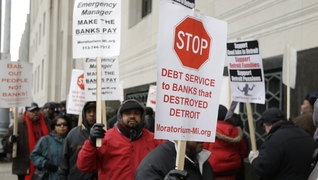A federal judge has approved Detroit’s bid to qualify for bankruptcy,
putting the city on a path to financial recovery — but threatening the
livelihoods of thousands of city workers. In a landmark decision that
could harm retiree benefits nationwide, federal Judge Steven Rhodes
ruled that federal bankruptcy law can override state laws that protect
public pensions. That clears the way for Detroit to make major cuts to
the health and retirement benefits of city employees. The city faces
about $18 billion in debt, of which $3.5 billion is pension obligations.
Detroit’s Emergency Manager Kevyn Orr has told public unions to brace
for "significant cuts," but has not laid out details. Workers’ pensions
in Detroit average around $19,000 per year. By the new year, Orr will
present a "plan of adjustment" in bankruptcy court that will clarify how
much pensions will be cut. The plan may also include a “fire sale” of
city assets that could result in public utilities and the Detroit
Institute of Arts collection being bartered off to private bidders.
Detroit’s bankruptcy filing marks a grim milestone in the decline of
what was once the country’s fourth-largest city, known as the Motor
City, the birthplace of the middle class. We are joined by Wallace
Turbeville, Senior Fellow at Demos and former Goldman Sachs executive
who has just authored the new report, "The Detroit Bankruptcy."
Turbeville argues that Detroit’s problems stem not from its liabilities
but from a decline in public revenues and involvement in harmful Wall
Street schemes.
Video
Source: democracynow.org
Author: --
Video
Source: democracynow.org
Author: --

No comments:
Post a Comment